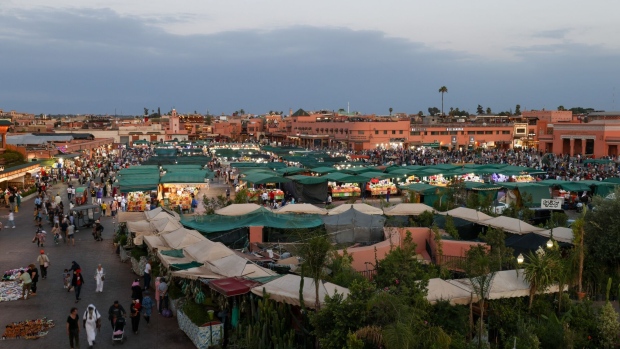Feb 27, 2024
Morocco Looks to World Cup to Fuel Planned 80% Boost in Tourism
, Bloomberg News

(Bloomberg) -- Morocco, long famous for its beach resorts and walled ancient cities, sees co-hosting the FIFA World Cup in 2030 as helping to bring about an 80% increase in tourists by the end of the decade.
Authorities have a target of boosting the number of visitors yearly by at least one million through 2030, bringing the total number to 26 million compared with 2023’s 14.5 million, Tourism and Handicrafts Minister Fatim-Zahra Ammor told Bloomberg in an interview.
Football’s World Cup Is Coming to North Africa for First Time
The plan is key for the economy of Morocco, which is still working to recover from the impact of last year’s devastating earthquake and is looking to attract new funds through investor incentives. It’s co-hosting the football championship with Spain and Portugal, and sees that as “a formidable opportunity” to develop tourism, Ammor said.
“The new objectives are quite a big challenge” and the adoption of a “whole ecosystem” is needed to ensure they are met, she said.
Read More: Quake-Struck Morocco to Spend Nearly $12 Billion on Recovery
Morocco last year started doubling the number of foreign flights serving the kingdom and reached an agreement with Ryanair Holdings Plc that is projected to more than double to 10 million the number of tourists the Irish airline flies to the country by 2027, Ammor said.
Authorities are “now working with several other carriers” to attain the growth objectives of 2030, according to Ammor, who declined to discuss details.
State controlled carrier, Royal Air Maroc, still plans to buy 150 new aircraft by 2037. Ammor said that while the government is expected to help cover the costs, “the speed of execution” remains in doubt given disruptions affecting the airline industry.
Authorities are also working on expanding national accommodation capacity ahead of the 2025 African Cup of Nations — another football tournament — and the World Cup. Morocco needs 150,000 additional beds to be ready before 2030, either through the upgrade of existing facilities or as greenfield projects.
A new investment charter, adopted in late 2022, is encouraging input from “investors who have never shown an interest in Morocco,” Ammor said. Other plans include 14 large-scale projects to add options for visitors, including amusement parks, hot air balloon sites and natural park resorts.
©2024 Bloomberg L.P.


